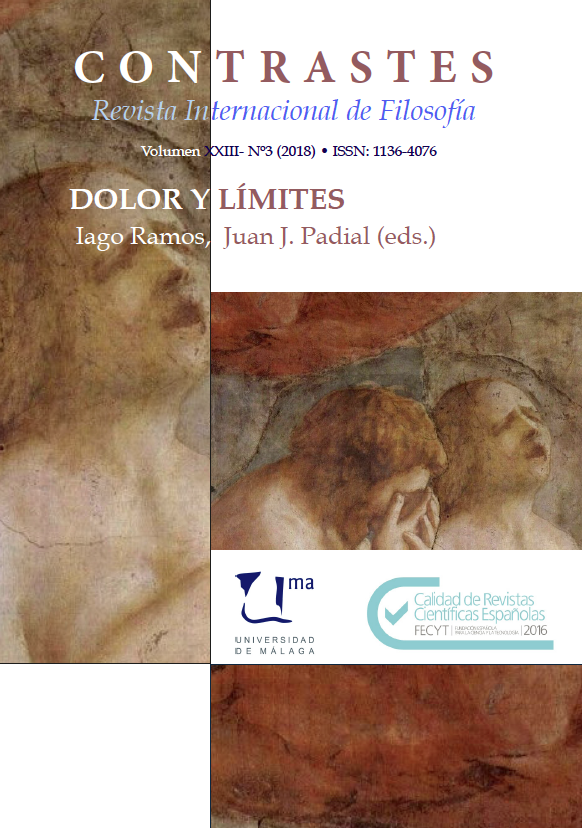The evolutionary explanation: The limits of desire theories of unpleasantness
DOI:
https://doi.org/10.24310/Contrastescontrastes.v23i3.6597Keywords:
DESIRE, UNPLEASANTNESS, EUTHYPHRO, MOTIVATION, INSTRUMENTAL, JUSTIFICATIONAbstract
Several theorists have defended that unpleasantness can be explained by appealing to (intrinsic, simultaneous, de re) desires for certain experiences not to be occurring. In a nutshell, experiences are unpleasant because we do not want them, and not vice versa. A common criticism for this approach takes the form of a Euthyphro dilemma. Even if there is a solution for this criticism, I argue that this type of approach is limited in two important ways. It cannot provide an explanation for: i) the motivation, from a psychological conscious point of view, nor ii) a non-instrumental justification, for having the relevant desires. The lack of these explanations is relevant since these are precisely the type clarifications that we would expect from a theory about unpleasantness.Downloads
Metrics
Publication Facts
Reviewer profiles N/A
Author statements
Indexed in
-
—
- Academic society
- N/A
- Publisher
- Universidad de Málaga
References
Anscombe, G. E. M. (1957). Intention. Oxford: Blackwell.
Armstrong, D. M. (1962). Bodily sensations. Routledge.
Brady, M. (2017). Painfulness, desire, and the Euthyphro dilemma. American Philosophical Quarterly. Retrieved from http://eprints.gla.ac.uk/135993/
Feldman, F. (2004). Pleasure and the good life: Concerning the nature, varieties, and plausibility of hedonism. Oxford: Clarendon Press.
Hall, R. J. (1989). Are pains necessarily unpleasant? Philosophy and Phenomenological Research, 49(June), 643–59.
Heathwood, C. (2006). Desire Satisfactionism and Hedonism. Philosophical Studies, 128(3), 539–563.
Heathwood, C. (2007). The reduction of sensory pleasure to desire. Philosophical Studies, 133(1), 23–44.
Heathwood, C. (2011). Desire-based theories of reasons, pleasure, and welfare. Oxford Studies in Metaethics, 6, 79–106.
Korsgaard, C. M. (1996). The origin of value and the scope of obligation. In O. O’Neill (Ed.), The sources of normativity. Cambridge: Cambridge University Press.
Pitcher, G. (1970). The awfulness of pain. Journal of Philosophy, 67(July), 481–491.
Schroeder, Tim. (2017). Desire. In E. N. Zalta (Ed.), The Stanford Encyclopedia of Philosophy (Summer 2017). Metaphysics Research Lab, Stanford University. Retrieved from https://plato.stanford.edu/archives/sum2017/entries/desire/
Schroeder, Timothy. (2004). Three faces of desire. Oxford: Oxford University Press.
Searle, J. R. (1979). Expression and meaning: Studies in the theory of speech acts. Cambridge: Cambridge University Press.
Smith, M. (1995). The moral problem. Malden, Mass. ; Oxford: Blackwell.
Downloads
Published
How to Cite
Issue
Section
License
This journal provides immediate free access to its content under the principle of making research freely available to the public. All content published in Contrastes. Revista Internacional de Filosofía, are subject to the Creative Commons Attribution-NonCommercial-ShareAlike 4.0 license whose full text can be found at <http://creativecommons.org/licenses/by-nc-sa/4.0>
It is the responsibility of the authors to obtain the necessary permissions of the images that are subject to copyright.
Authors whose contributions are accepted for publication in this journal will retain the non-exclusive right to use their contributions for academic, research and educational purposes, including self-archiving or repository in open access repositories of any kind.
The electronic edition of this magazine is edited by the Editorial Service of the University of Malaga (Uma Editorial), being necessary to cite the origin in any partial or total reproduction.










5.png)
